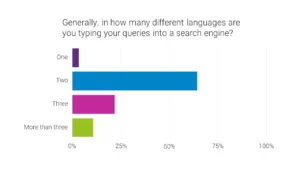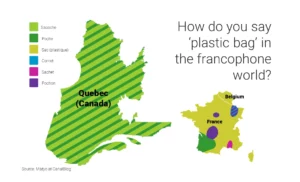
The evolving landscape of multilingual digital marketing: A 2023 perspective
In the not-so-distant past, the concept of ‘going global’ for businesses in non-Anglosphere countries primarily involved creating an English version of their company website. Today, this approach seems narrow-minded and overly simplistic in understanding the world’s diverse linguistic landscape. However, similar assumptions can still be made when targeting foreign audiences, such as the common mistake of wishing to translate your website into a generic ‘Chinese’. Beyond the complexities of recognising that multiple languages can be native to a single country, it’s important to acknowledge that roughly half of the world’s population speaks more than one language.
This raises a critical question for businesses expanding their online presence in new markets: Is targeting a single language still the most effective way to engage with a diverse and multilingual target audience?
Multilingualism across the globe: A pervasive reality
Multilingualism isn’t confined to specific regions or demographics; it’s a global phenomenon found on every continent, across all social strata, and among all age groups. Yet surprisingly, the digital marketing landscape often overlooks bilingual and multilingual individuals, with multilingualism typically taken into account only in countries officially recognised as such, like Switzerland or Belgium.
One driving factor behind multilingualism is the worldwide number of expatriates, which is on the rise. In 1960, there were 73 million expats worldwide while today, there are 230 million. If all the expats in the world were to form an imaginary country, it would be the 6th most populous country in the world, with a bigger population than Nigeria, Brazil, or Bangladesh.
The United Arab Emirates is the country with the highest proportion of expatriates (89% of the total population). While this high proportion makes the UAE an outlier, many countries have large numbers of expatriates, and the twin forces of globalisation and digitalisation mean this trend will only intensify. In addition, despite tourism taking a hit during and after the pandemic, there are still about 1 billion international tourism arrivals per year. This volume of people on the move underscores the importance of considering the multilingual aspects of all countries in the context of digital marketing.
Take, for example, a sightseeing or attractions brand with a presence in the world’s major cities. The target audience for this brand could be travellers from all over the world, searching at different stages of their journey – i.e. before the travel, and during the trip itself. Such a brand needs to take multilingual searching seriously to avoid missing sizeable opportunities.
Beyond a single language: The multilingual searcher
Expanding your reach globally requires a nuanced approach. In the world of search and the internet, every keyboard stroke matters. Consider, for instance, a Swiss resident who is a native French speaker but also proficient in German and English. Despite their multilingual abilities, they might exclusively use English when searching for cloud computing software.
To gain insight into how multilingual individuals conduct their searches, we surveyed our Local In-Market Experts (LIMEs), each fluent in at least two languages – English and a local official language. The survey revealed a clear trend: the majority of individuals (97%) search in at least two different languages, with one in five of our LIMEs conducting research in three different languages regularly.

Regionalism and dialect: A nuanced challenge
Regionalism and dialect are additional factors to consider. In our survey, 80% of LIMEs indicated they avoid using regionalism or dialect in their search queries, as they don’t expect websites to offer content in these variant languages.
However, integrated dialect words within official languages should not be overlooked. For example, consider searching for ‘plastic bag’ in French. The search results vary within French-speaking regions and individual countries/states. Not all users are aware of how search engines function and that their specific dialect might not be accommodated in website design and configuration.

Understanding these differences allows for broader targeting or prioritisation of specific geographical areas based on cultural knowledge to make informed decisions.
Key considerations for a multilingual strategy
SEO: IP recognition is not useful to set up the language version of a website automatically. You may be staying in France but not speaking French and so imagine the challenge you face when your favourite e-commerce website will appear by default in French. Many web developers prefer this as an implementation for international websites but global user experience will always suffer from it.
Paid search: Crafting a comprehensive keywords list that accommodates dialects and regional variations is essential. Local In-Market Experts can provide invaluable insights into cultural nuances that impact keyword choices.
Content marketing: Creativity and adaptability are crucial. Organising target audiences into diverse personas that reflect a country’s complexity can enhance understanding and prioritisation within a multi-area context.
Website localisation: Tailoring the content, layout, and user interface of your website to suit the linguistic and cultural preferences of specific target markets is vital. Localise not only language but also date formats, currencies, and culturally appropriate visuals.
Social media engagement: Customise your social media presence for different linguistic audiences. This includes not only translating posts but also considering cultural references, holidays, and trending topics specific to each region.
Multilingualism is key to global business success
In conclusion, regionalism, multilingualism, and global mobility are factors that businesses must consider to maximise their search opportunities. Meticulous market analysis and the establishment of prioritised personas are essential steps in navigating this complex landscape. Using Local In-Market Experts with an intimate knowledge of their culture and language is invaluable in achieving global business success. Embracing the evolving landscape of multilingual digital marketing is not just a trend; it’s a strategic imperative in today’s interconnected world.
. . .
To find out how Oban’s LIME network can help accelerate your brand’s international growth, please get in touch.